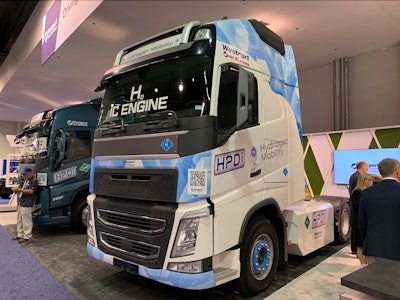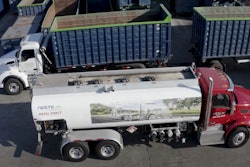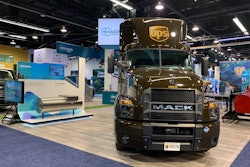![Westport’s High Pressure Direct Injection display at ACT Expo earlier this month attracted plenty of attention. Westport, which advertises the system for natural gas and hydrogen engines, states on its website that “HPDI with 40% biomethane delivers the same life cycle CO2 reductions as fuel cells using blue/green hydrogen blends, and can deliver zero [well-to-wheels] CO2 with pure biomethane.”](https://img.ccjdigital.com/files/base/randallreilly/all/image/2023/05/Westport_HDPI.6477811b5137f.png?auto=format%2Ccompress&q=70&w=400)
Visit California’s website for its Hybrid and Zero-Emission Truck and Bus Voucher Incentive Project and it’s easy to see why some fleets might be willing to give zero emission trucks a try.
The Golden State is currently offering $120,000 to help subsidize the purchase of a Class 8 all-electric truck and $240,000 for a hydrogen fuel cell truck. Eight electric and four fuel cell models are currently eligible.
Though HVIP’s Class 8 lineup doesn’t include natural gas trucks, there are at least three federal grant programs that can help fleets make the switch along with several state programs, according to Natural Gas Vehicles for America.
While incentives have long attracted fleets to take on more costly, cleaner running trucks, Westport Fuel Systems CEO David Johnson suggested that the stick approach might fare better, particularly for natural gas trucks.
Diesel combustion emits the greatest amount of greenhouse gases out of all transportation fuels, according to the California Air Resources Board and the Environmental Protection Agency, which led Johnson to pitch a disincentive regarding its use.
“Listen, if you want to use less diesel, just charge $10 a gallon and everybody will use less diesel,” Johnson said at the Advanced Clean Transportation Expo in Anaheim, California earlier this month where the Tier 1 Canadian-based manufacturer displayed its High Pressure Direct Injection (HPDI) fuel system for Class 8 bio-LNG and hydrogen trucks.
[Related: Westport debuts hydrogen HPDI system]
 Westport's High Pressure Direct Injection trucks, a bio-LNG model on the left and a hydrogen version on the right, offer faster fill times than all-electric and greater range while drastically cutting emissions over conventional diesel.Tom Quimby
Westport's High Pressure Direct Injection trucks, a bio-LNG model on the left and a hydrogen version on the right, offer faster fill times than all-electric and greater range while drastically cutting emissions over conventional diesel.Tom Quimby
“One of the problems we've had in natural gas trucking is that if you say, ‘Okay, I'm going to buy 10 [natural gas] trucks for my 100 truck fleet this year because natural gas is cheap so I can make good TCO, I can serve my customers and I can make the company more profitable. Great!’” Johnson said.
“And so you buy those trucks and then all of a sudden the price of natural gas goes up and then what? So this is where CARB putting their thumb on the scale can be very, very helpful. You want the industry and the world to be cleaner? Charge more for things that aren't clean. I'd actually like to see the whole regime flipped. Instead of incentives for clean, how about disincentives for dirty?”
Carrot preferred over the stick
When approached with the idea of raising the price on diesel to help drum up more interest in natural gas vehicles, NGVA President Daniel Gage pointed out that his non-profit has been busy in Washington D.C. pushing for additional natural gas incentives. NGVA introduced its Renewable Natural Gas Incentive Act of 2023 to Congress in April. The bipartisan effort seeks to provide a $1 per gallon tax credit for vehicles that use RNG which, according to CARB, has the lowest carbon intensity level of all transportation fuels.“Natural gas motor fuel currently enjoys a 50-cents per gallon tax credit,” Gage said. “We’d like to see our $1 per gallon RNG incentive bill passed into law. That would provide an even greater incentive to transition to RNG-fueled trucks.
“Another strong tax incentive to encourage the transition would be to adjust the FET (Federal Excise Taxes) – at least eliminate the added tax associated with the natural gas vehicle’s incremental cost so purchasers aren’t in essence penalized tax-wise for upgrading and buying a cleaner truck,” Gage continued. “The FET, on top of the regular incremental costs, makes the ROI numbers not work for too many fleets that do not hold their trucks long enough.”
[Related: Ethanol trucks coming to Texas in June]
Rick Mihelic, director of emerging technologies at the North American Council for Freight Efficiency, sees incentives attracting more fleets to alt fuel versus the stick approach of raising the cost of diesel.
“Tax increases are generally non-starters in public and commercial circles,” Mihelic said. “The alternative is finding ways to differentially decrease taxes to encourage market changes which often seems more palatable.
“Hence, some places, for example, have lower registration fees for ZEV vehicles, or have eliminated tolls, or allowed use of high occupancy lanes which reduces travel time (which can translate to cost reduction), etc.,” Mihelic continued. “Market-based methods are also possible such as fuel surcharges, selectively adding cost to the customer but not the truck operator. RD (renewable diesel) and RNG/CNG have many potential methods to improve cost parity with fossil diesel.”
[Related: Walmart 'betting big' on Cummins new X15N]
Johnson fully realizes that the notion of implementing disincentives like raising the price of diesel to promote cleaner powertrain technologies is a long shot. When asked how he was progressing on that front he smiled and said, “I’ll keep working. There’s 8 billion people in the world. It's one by one.”
At this point, diesel appears safe from any additional price hikes. In fact, Tom Kloza, chief oil analyst and global head of energy analysis at Oil Price Information Service, said Wednesday that a softening freight market has diesel “cheaper than gasoline in some cases,” though ultimately OPIS believes “it will continue to fetch a premium to gasoline under most circumstances.”
Johnson’s idea of raising diesel prices has apparently not taken hold just yet.
“I'm not aware of any action taken to boost the price and spur use of alternative fuels,” Kloza said.











